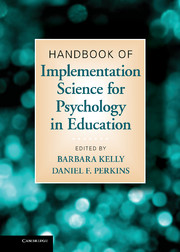Book contents
- Handbook of Implementation Science for Psychology in Education
- Handbook of Implementation Science for Psychology in Education
- Copyright page
- Dedication
- Contents
- Contributors
- Foreword
- Part I What is Implementation Science?
- Part II Statistical Problems, Approaches, and Solutions in Real-World Contexts
- Part III Preparing for Effective Implementation:
- Chapter 7 Implementation Science and Enhancing Delivery and Practice in School Psychology Services
- Chapter 8 The Role of Executive Problem-Solving Frameworks in Preparing for Effective Change in Educational Contexts
- Chapter 9 Researching Readiness for Implementation of Evidence-Based Practice
- Chapter 10 Change-Focused Organizational Consultation in School Settings
- Chapter 11 Implementation of Interventions to Promote School Readiness
- Part IV Successful Implementation of Specific Programmes and Interventions:
- Part V Improving the Implementation of Evidence-Based Programmes And Interventions via Staff Skills, Organisational Approaches, and Policy Development
- Part VI Signposts Toward Effectiveness
- Index
Chapter 11 - Implementation of Interventions to Promote School Readiness
from Part III - Preparing for Effective Implementation:
Published online by Cambridge University Press: 05 November 2012
- Handbook of Implementation Science for Psychology in Education
- Handbook of Implementation Science for Psychology in Education
- Copyright page
- Dedication
- Contents
- Contributors
- Foreword
- Part I What is Implementation Science?
- Part II Statistical Problems, Approaches, and Solutions in Real-World Contexts
- Part III Preparing for Effective Implementation:
- Chapter 7 Implementation Science and Enhancing Delivery and Practice in School Psychology Services
- Chapter 8 The Role of Executive Problem-Solving Frameworks in Preparing for Effective Change in Educational Contexts
- Chapter 9 Researching Readiness for Implementation of Evidence-Based Practice
- Chapter 10 Change-Focused Organizational Consultation in School Settings
- Chapter 11 Implementation of Interventions to Promote School Readiness
- Part IV Successful Implementation of Specific Programmes and Interventions:
- Part V Improving the Implementation of Evidence-Based Programmes And Interventions via Staff Skills, Organisational Approaches, and Policy Development
- Part VI Signposts Toward Effectiveness
- Index
Summary
Keywords
- Type
- Chapter
- Information
- Handbook of Implementation Science for Psychology in Education , pp. 184 - 204Publisher: Cambridge University PressPrint publication year: 2012

